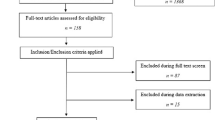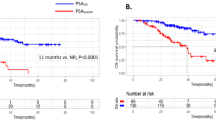Abstract
Background:
PSA doubling time (PSADT) is an attractive intermediate end point for assessing novel therapies in biochemically recurrent prostate cancer (BRPC). This study explores whether PSADT calculations are influenced by frequency/duration of PSA measurements, and whether statistical variability leads investigators to find false significant results.
Methods:
In retrospective analyses of two BRPC cohorts: Johns Hopkins Hospital (JHH) patients who deferred therapy and placebo patients on a randomized clinical trial (RCT), we calculated changes in PSADT from early measurements to later measurements using subsets of available PSAs for patients with ⩾6 and ⩾9 PSAs. We simulated hypothetical single-arm trials using randomly selected, 50-patient subsets and simulated two-arm RCTs.
Results:
JHH cohort (n=205) had median follow-up 58 months, median age 61 years and median Gleason 7. PSA variability changed with duration of PSA measurement as median within-patient PSADT increases for men with >6 PSAs ranged from 1.0 to 1.4 months by PSA subset while increases for men with ⩾9 PSAs ranged from 3.9 to 4.1 months. Frequency of measurement did not change PSA variability as PSADT increase was unchanged when odd values were used instead of all values. Approximately 30% of JHH men experienced >200% increases in PSADT. Up to 62% of 50-patient single-arm simulations detected a significant PSADT change, whereas simulated RCTs did not. Results were supported in the RCT placebo cohort; 46% of patients experienced PSADT increases >200%.
Conclusions:
These data suggest that calculated PSADT in BRPC may naturally increase over time in the absence of therapy and may be influenced by duration of PSA follow-up. As a result, single-arm trials could show false significant increases despite the lack of active treatment of these patients. Placebo-controlled RCTs including clinical end points are recommended to screen novel agents in men with BRPC to mitigate bias because of natural PSADT variability.
This is a preview of subscription content, access via your institution
Access options
Subscribe to this journal
Receive 4 print issues and online access
$259.00 per year
only $64.75 per issue
Buy this article
- Purchase on Springer Link
- Instant access to full article PDF
Prices may be subject to local taxes which are calculated during checkout

Similar content being viewed by others
References
Roehl KA, Han M, Ramos CG, Antenor JA, Catalona WJ . Cancer progression and survival rates following anatomical radical retropubic prostatectomy in 3,478 consecutive patients: long-term results. J Urol 2004; 172: 910–914.
Freedland SJ, Humphreys EB, Mangold LA, Eisenberger M, Dorey FJ, Walsh PC et al. Risk of prostate cancer-specific mortality following biochemical recurrence after radical prostatectomy. JAMA 2005; 294: 433–439.
Kupelian PA, Mahadevan A, Reddy CA, Reuther AM, Klein EA . Use of different definitions of biochemical failure after external beam radiotherapy changes conclusions about relative treatment efficacy for localized prostate cancer. Urology 2006; 68: 593–598.
Trock BJ, Han M, Freedland SJ, Humphreys EB, DeWeese TL, Partin AW et al. Prostate cancer-specific survival following salvage radiotherapy vs observation in men with biochemical recurrence after radical prostatectomy. JAMA 2008; 299: 2760–2769.
Pound CR, Partin AW, Eisenberger MA, Chan DW, Pearson JD, Walsh PC . Natural history of progression after PSA elevation following radical prostatectomy. JAMA 1999; 281: 1591–1597.
Paller CJ, Antonarakis ES . Management of biochemically recurrent prostate cancer after local therapy: evolving standards of care and new directions. Clin Adv Hematol Oncol 2013; 11: 14–23.
Schroder F, Bangma C, Angulo JC, Alcaraz A, Colombel M, McNicholas T et al. Dutasteride treatment over 2 years delays prostate-specific antigen progression in patients with biochemical failure after radical therapy for prostate cancer: results from the randomised, placebo-controlled Avodart after Radical Therapy for Prostate Cancer Study (ARTS). Eur Urol 2012; 63: 779–787.
Joensuu G, Joensuu T, Nupponen N, Ruutu M, Collan J, Pesonen S et al. A phase II trial of gefitinib in patients with rising PSA following radical prostatectomy or radiotherapy. Acta Oncol 2012; 51: 130–133.
Kwan W, Duncan G, Van Patten C, Liu M, Lim J . A phase II trial of a soy beverage for subjects without clinical disease with rising prostate-specific antigen after radical radiation for prostate cancer. Nutr Cancer 2010; 62: 198–207.
Hebert JR, Hurley TG, Harmon BE, Heiney S, Hebert CJ, Steck SE . A diet, physical activity, and stress reduction intervention in men with rising prostate-specific antigen after treatment for prostate cancer. Cancer Epidemiol 2012; 36: e128–e136.
Marschner N, Ruttinger D, Zugmaier G, Nemere G, Lehmann J, Obrist P et al. Phase II study of the human anti-epithelial cell adhesion molecule antibody adecatumumab in prostate cancer patients with increasing serum levels of prostate-specific antigen after radical prostatectomy. Urol Int 2010; 85: 386–395.
Antonarakis ES, Zahurak ML, Lin J, Keizman D, Carducci MA, Eisenberger MA . Changes in PSA kinetics predict metastasis- free survival in men with PSA-recurrent prostate cancer treated with nonhormonal agents: combined analysis of 4 phase II trials. Cancer 2011; 118: 1533–1542.
Antonarakis ES, Feng Z, Trock BJ, Humphreys EB, Carducci MA, Partin AW et al. The natural history of metastatic progression in men with prostate-specific antigen recurrence after radical prostatectomy: long-term follow-up. BJU Int 2012; 109: 32–39.
Antonarakis ES, Chen Y, Elsamanoudi SI, Brassell SA, Da Rocha MV, Eisenberger MA et al. Long-term overall survival and metastasis-free survival for men with prostate-specific antigen-recurrent prostate cancer after prostatectomy: analysis of the Center for Prostate Disease Research National Database. BJU Int 2010; 108: 378–385.
Smith MR, Manola J, Kaufman DS, George D, Oh WK, Mueller E et al. Rosiglitazone versus placebo for men with prostate carcinoma and a rising serum prostate-specific antigen level after radical prostatectomy and/or radiation therapy. Cancer 2004; 101: 1569–1574.
Smith MR, Manola J, Kaufman DS, Oh WK, Bubley GJ, Kantoff PW . Celecoxib versus placebo for men with prostate cancer and a rising serum prostate-specific antigen after radical prostatectomy and/or radiation therapy. J Clin Oncol 2006; 24: 2723–2728.
Acknowledgements
This study was supported by NIH (T32: 5T32CA009071-29; Core: P30-CA006973-41S2), NCI SPORE Grant P50CA58236, and the Young Investigator Award from the American Society of Clinical Oncology Conquer Cancer Foundation. Placebo data were provided by Abbott Laboratories.
Author information
Authors and Affiliations
Corresponding author
Ethics declarations
Competing interests
The authors declare no conflict of interest.
Rights and permissions
About this article
Cite this article
Paller, C., Olatoye, D., Xie, S. et al. The effect of the frequency and duration of PSA measurement on PSA doubling time calculations in men with biochemically recurrent prostate cancer. Prostate Cancer Prostatic Dis 17, 28–33 (2014). https://doi.org/10.1038/pcan.2013.40
Received:
Revised:
Accepted:
Published:
Issue Date:
DOI: https://doi.org/10.1038/pcan.2013.40
Keywords
This article is cited by
-
Opportunities and challenges for research on low-carbohydrate diets in prostate cancer
Nature Reviews Urology (2020)
-
A review of pomegranate in prostate cancer
Prostate Cancer and Prostatic Diseases (2017)
-
A randomized, double-blind, placebo-controlled study of the effects of pomegranate extract on rising PSA levels in men following primary therapy for prostate cancer
Prostate Cancer and Prostatic Diseases (2015)
-
Change in PSA velocity is a predictor of overall survival in men with biochemically-recurrent prostate cancer treated with nonhormonal agents: combined analysis of four phase-2 trials
Prostate Cancer and Prostatic Diseases (2015)



